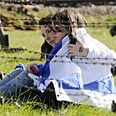
Study: 83% of students want more lessons on Holocaust
Poll finds 80% of high-school students believe learning about the Holocaust is relevant to their lives, those who participate in school-organized trips to death camps in Poland feel more bound to universal human values
Thirty-four years after the Holocaust, the Education Ministry decided a special lesson program should be implemented in high-schools to teach younger generations about the Holocaust and the events leading up to it. Now 30 years after students began formally studying one of the darkest periods in Jewish history, and 10 years after schools began sending organized groups to Poland, a new study is seeking to examine what kind of an impact the special program has achieved.
The study will be presented at the largest teacher's conference on Holocaust education, which opened at Yad Vashem on Monday.
The two-year study was conducted by Dr. Erik Cohen of the Bar Ilan University's Churgin School of Education, and was funded by the Claims Conference. Over 2,500 students took part in the study, as well as hundreds of high-school teachers and administrators.
"The most important thing that this research demonstrates is that the theme has no borders, there is no difference between religious or secular (students)," Cohen explains. "There's a claim that the Holocaust is closer to Ashkenazi students, we looked into the sector issue and found no differences. This issue is central to everyone. It is at the core of Jewish-Israeli identity. The study also showed that there are far fewer disciplinary problems in lessons dealing with the Holocaust; in a roundabout way this teaches us that students in Israel have an overwhelming respect for the subject."
Students asking for more
The study found that 83% of the students are interested in expanding Holocaust studies, 80% say they feel the material taught in these classes is relevant to their lives. Students at secular schools feel they know more about the Holocaust compared to religious schools.
The study took a close look at the annual school trips to Poland for 11th graders, as these trips have at times garnered bad press due to inappropriate behavior from students, mostly when they are caught drinking alcohol.
"There's a big difference between students who went to Poland and those who didn't," Cohen stresses. "Students who did go want to learn more, and feel more obligated to universal values. What the media puts a spotlight on are isolated incidents. The trip to Poland is very central to the students."
Cohen also found that Holocaust education has remained one of the most stable curriculums in the system.
"There is a consistent effort here to teach and to educate. It is an effort that hasn't been abandoned since
it began 30 years ago. It's only growing, and today we have a massive accumulation (of knowledge). In this field the roads are paved, the books we teach from today are the same books, but slightly improved. This affords great stability, and that is perhaps the most impressive thing."
Avner Shalev, chairman of the Yad Vashem directorate: "The study's findings prove that the Holocaust refuses to be just a history lesson. The hard work of the Yad Vashem's School for Holocaust Studies has managed to make Holocaust education meaningful and relevant to today's students. Teaching the Holocaust has become a discipline unto its own."










